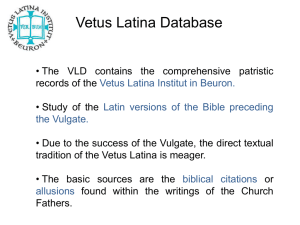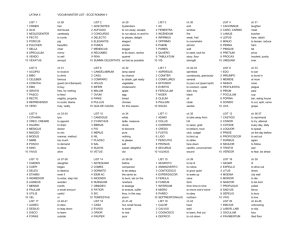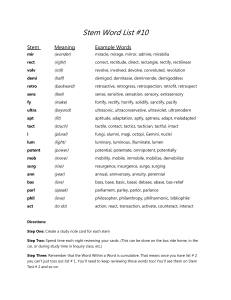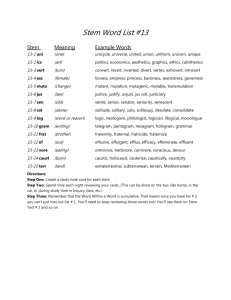4 th Year Latina/o STEM Students (n=594)
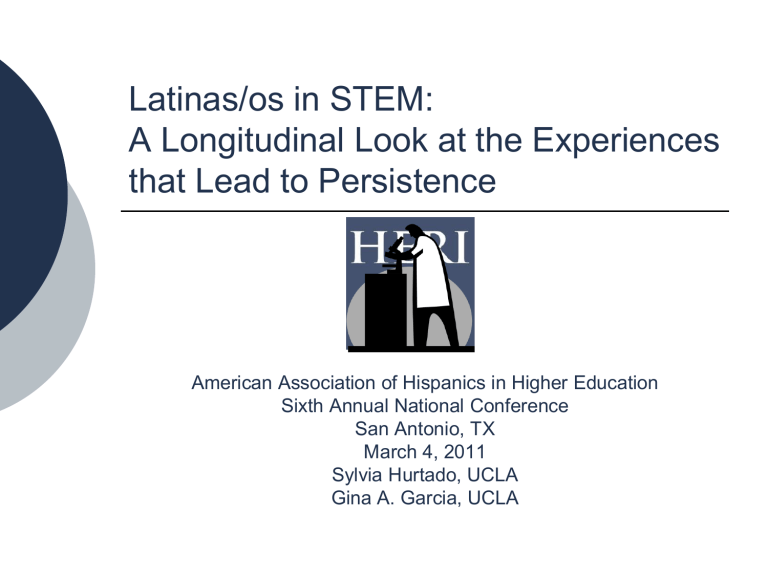
Latinas/os in STEM:
A Longitudinal Look at the Experiences that Lead to Persistence
American Association of Hispanics in Higher Education
Sixth Annual National Conference
San Antonio, TX
March 4, 2011
Sylvia Hurtado, UCLA
Gina A. Garcia, UCLA
Background
National call to increase the participation of Latinas/os in STEM degrees and careers
America COMPETES Act
College Cost Reduction and Access Act
Health Care and Education Reconciliation Act
Latinas/os
15% of the U.S. population in 2007
Earned 7.2% of all STEM bachelor’s degrees awarded in 2006
Made up 5.2% of STEM workforce in 2006
Sample
UCLA’s Cooperative Institutional Research
Program (CIRP)
The Freshman Survey (TFS) 2004
Your First College Year (YFCY) 2005
College Senior Survey (CSS) 2008
Graduate Student Focus Groups 2009-2010
BBS vs. STEM
BBS Majors
Biology
Biochemistry
Biophyshics
Microbiology
Bacteriology
Zoology
Chemistry
Medicine
Dentistry
Veterinary Medicine
Pharmacy
Psychology
STEM majors
BBS majors plus…
Aeronautical Engineering
Civil Engineering
Chemical Engineering
Computer Engineering
Electrical Engineering
Industrial Engineering
Mechanical Engineering
Astronomy
Mathematics
Physics
Nursing
Aspiring Scientists-Fall 2004
(n=5,425)
In comparison to White students, Latina/o aspiring scientists…
Have higher financial concerns
Are less prepared academically
Have lower academic self-confidence
Take fewer math & science courses in high school
Have lower aspirations for pursuing a career as a scientific researcher
Aspiring Scientists-Fall 2004
(n=5,425)
Academic Indicators
Latina/o White
81,9
71,5
53
54,6
60,5
42,1
Perceptions of Math
Confidence
Perceptions of
Academic Ability
2 or More Biology
Courses (HS)
Aspiring Scientists-Fall 2004
(n=5,425)
In comparison to White students, more
Latina/o aspiring scientists…
Attend institutions w/ NIH-sponsored programs
Participate in summer research programs & health science research programs (prior to college)
Aspire for a Ph.D. or Ed.D.
Aspire to become a physician
Aspiring Scientists-Fall 2004
(n=5,425)
Aspirations
Latina/o White
35,8
31,5 31,3
26,9
Aspire to Ph.D. or Ed.D.
Aspire to become a Physician
Emerging Scientists-Spring 2005
(n=674)
In comparison to White and Asian students, Latina/o emerging scientists…
Have higher financial concerns
Have lower academic performance (grades)
Have lower academic self-confidence
Experience higher rates of racial tension or discrimination on campus
Emerging Scientists-Spring 2005
(n=674)
18,8
Racial Tension or Discrimination
Latina/o BBS White/Asian BBS
19,3
16,3
11,7
13,4
11,4
Singled out because of race, gender, sexual orientation
Heard faculty express stereotypes about racial/ethnic groups
Racial tension on this campus
Emerging Scientists-Spring 2005
(n=674)
In comparison to White and Asian students, more Latina/o emerging scientists…
Have a desire to improve the health of minority communities
Took a first-year experience course
Worked on a professor’s research project in their first year
4 th Year Latina/o STEM Students
(n=594)
Decline in aspirations for Ph.D. or Ed.D. (from freshman year)
Increase in aspirations for M.A. or M.S. (from freshman year)
Higher debt accumulation than White and Asian STEM students
More likely than White and Asian students to help support family
4 th Year Latina/o STEM Students
(n=594)
50
Source of Financial Support
$0-$2,999 $3,000-$9,999 $10,000 or more
45
42
34
28
25 25
24
27
Family Grants &
Scholarships
Loans
4 th Year Latina/o STEM Students
(n=594)
Co-curricular Involvement
62,1
26,8
22,7
Academic
Program for
URM
Club Related to Major
Undergrad
Research
Program
4 th Year Latina/o STEM Students
(n=594)
Science Identity
Improving the health of minority communities
61,2
61,9
Working to find a cure for a health problem
53
56,5
57,7
Making a theoretical contribution to science
39,1
39,2
41,5
Becoming an authority in my field
61,2
65,6
61,7
0 10 20 30 40 50 60 70
2004 2005 2008
4 th Year Latina/o STEM Students
(n=594)
Predictors of Persistence
College generational status (-)
Standardized test scores (+)
Participation in a club/organization related to major (+)
Participation in undergraduate research (+)
Sense of belonging (+)
Negative cross-racial interactions (-)
Latina/o Graduate STEM
And like I said before, I always thought it was just gonna be med school – that’s what I envisioned. I took all the prerequisites, even the MCAT’s, but I participated in a research program and I really liked it. So as far as graduate school, once I took that program I started my last semester in research with the person that’s now my advisor.
She’s the one that introduced me to several scholarship programs that were available in graduate school.
(Lauren, Latina, Molecular Biology, HSI)
Latina/o Graduate STEM
But this professor saw something else and gave me this opportunity to work in his lab. And that’s when I started doing more energy related research. And from there, I could start seeing there’s something else that I could do here. And he paid for [me to attend a] conference. I got accepted and we did this fellowship. So that gave me more information about more PhD programs.
And then he helped me to apply for a PhD. So when I left school, I got accepted in two schools first for doing the Ph.D.
(Tyler, Latino, Chemical/Biomolecular
Engineering, PWI)
Latina/o Graduate STEM
I didn't know about grad school or anything, when I [started undergrad]. But I was in a few of the undergraduate minority research programs, almost all throughout my undergraduate years, like three years.
And they always did encourage me to go to graduate school. So, I knew that I definitely did want to go to grad school, eventually, and do research.
(George, Latino, Molecular Biology, PWI)
Implications for Practice
Early attention and program interventions to encourage and sustain Latina/o science talent
Focus interventions on points of loss —1 st year, entrance to the major, transition to post grad
Greater institutional efforts are needed to position Latina/os for entering graduate programs
Implications for Practice
Financial concerns are a key barrier for
STEM: Consider debt forgiveness for entering STEM or teaching in science
UG Programs should include stipends and book grants to cover the costs of expensive but necessary texts
Continue funding to institutions and support Latina/o faculty who are mentoring the next generation
Contact Information
Faculty and Co-PIs:
Sylvia Hurtado
Mitchell Chang
Postdoctoral Scholars:
Kevin Eagan
Josephine Gasiewski
Administrative Staff:
Aaron Pearl
Graduate Research Assistants:
Christopher Newman
Minh Tran
Jessica Sharkness
Gina Garcia
Felisha Herrera
Cindy Mosqueda
Juan Garibay
Tanya Figueroa
Papers and reports are available for download at:
http://heri.ucla.edu/nih
Project e-mail: herinih@ucla.edu
Acknowledgments: This study was made possible by the support of the National
Institute of General Medical Sciences, NIH Grant Numbers 1 R01 GMO71968-
01 and R01 GMO71968-05 as well as the National Science Foundation, NSF
Grant Number 0757076. This independent research and the views expressed here do not indicate endorsement by the sponsors.
